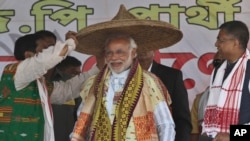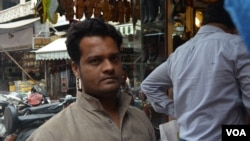NEW DELHI —
India’s controversial prime minister candidate Narendra Modi is believed to be the front-runner in elections that begin next week. His promise of change has gained him an apparent edge in the closely-watched political contest.
At a busy Metro station outside New Delhi in India’s corporate hub, Gurgaon, young professionals dash to reach their offices. But they pause for a moment to say they will vote for Narendra Modi of the main opposition Bharatiya Janata Party.
“We see hope from him," one voter said. "We see that maybe after Modi comes our system is going to improve in many ways in terms of safety, corruption, better economic development, we see our country rising.”
“I think the kind of image he has, definitely he had certain issues in the past, but the kind of things he has done in Gujarat, he makes a cut above all,” another voter opined.
“For sure, BJP. Modi seems to be a strong leader,” a third voter agreed.
Many here are enthused by 63-year-old Modi’s promise to reinvigorate India’s declining economy by replicating nationwide the development model he has spearheaded as chief minister of the western state of Gujarat.
Modi points to his track record in his state: economic growth and literacy rates that are higher than the national average and a flood of business investment due to the creation of sound infrastructure and a reduction in bureaucracy under his watch.
As he travels across India with his energetic campaign, Modi promises to fast-track development to meet the aspirations of a country where two-thirds of the 1.2 billion population are under the age of 35.
Modi says changing the country’s destiny, giving job opportunities to the youth, improving the lives of farmers, giving homes, clean water and education to the poorest is a dream he can fulfill.
His supporters are not troubled by questions over Modi’s secular credentials following Hindu-Muslim riots that killed more than 1,000 people, mostly Muslims in his state in 2002. The Indian Supreme Court has cleared him of involvement.
But Modi’s role during the Gujarat riots continues to raise questions among political opponents and India's Muslim minority.
Political analysts say Modi's advantage is due to the widespread frustration with the Congress Party, which is seen as squandering economic opportunity due to corruption and indecisive leadership.
At a Muslim-dominated market in the Indian capital, there is huge anger with the ruling Congress Party for rising inflation. But this anger does not translate into support for BJP's Modi, because there is deep suspicion of a man who they hold responsible for the sectarian violence.
Rashid Ali, 31, who works in a roadside stall selling footwear, says the reins of the government should not be given to Modi. He says leaders are always involved in the type of riots that racked Gujarat, adding that Muslims want peace, they do not want to fight with anyone.
In a neighboring shop, Mohammad Sami echoes Ali's feelings. He says he is fed up with India's ruling coalition, but will not opt for the main opposition BJP.
Sami calls the BJP our open enemy. He says it is dangerous and will divide the people in the country.
Modi brushes aside such fears in his campaign speeches, saying he remains committed to the country’s secular identity. His efforts to dispel concerns appears to be succeeding, as his image as an effective administrator is overriding fears of anti-Muslim bias.
Opinion polls show Modi remains the front-runner in the upcoming election. The BJP is not projected to win a parliamentary majority, but hopes to stitch together an alliance.
Independent analyst and former journalist Ajoy Bose says Modi is being made out to be “larger than life.”
“There is a great disenchantment with the Congress's own past 10 years," said Bose. "Modi promises a change, Modi promises to be decisive, all the things which the Congress has failed to be. They have had a prime minister who seems to be in denial over his responsibilities as prime minister, so Modi is a powerful figure ... I do not think there is much of an emotional connect with him [Modi], there is of course a mental connect with a man who can get the country going.”
Bose says Modi is also backed by big business, which sees him as a man who can pull India out of its economic stagnation.
Political analysts say there is a Modi "buzz," but there is no Modi "wave” and caution India’s massive electorate is so diverse that results are often hard to predict. But they agree he appears to represent what a young country is seeking: hope, change, and leadership.
At a busy Metro station outside New Delhi in India’s corporate hub, Gurgaon, young professionals dash to reach their offices. But they pause for a moment to say they will vote for Narendra Modi of the main opposition Bharatiya Janata Party.
“We see hope from him," one voter said. "We see that maybe after Modi comes our system is going to improve in many ways in terms of safety, corruption, better economic development, we see our country rising.”
“I think the kind of image he has, definitely he had certain issues in the past, but the kind of things he has done in Gujarat, he makes a cut above all,” another voter opined.
“For sure, BJP. Modi seems to be a strong leader,” a third voter agreed.
Many here are enthused by 63-year-old Modi’s promise to reinvigorate India’s declining economy by replicating nationwide the development model he has spearheaded as chief minister of the western state of Gujarat.
Modi points to his track record in his state: economic growth and literacy rates that are higher than the national average and a flood of business investment due to the creation of sound infrastructure and a reduction in bureaucracy under his watch.
As he travels across India with his energetic campaign, Modi promises to fast-track development to meet the aspirations of a country where two-thirds of the 1.2 billion population are under the age of 35.
Modi says changing the country’s destiny, giving job opportunities to the youth, improving the lives of farmers, giving homes, clean water and education to the poorest is a dream he can fulfill.
His supporters are not troubled by questions over Modi’s secular credentials following Hindu-Muslim riots that killed more than 1,000 people, mostly Muslims in his state in 2002. The Indian Supreme Court has cleared him of involvement.
But Modi’s role during the Gujarat riots continues to raise questions among political opponents and India's Muslim minority.
Political analysts say Modi's advantage is due to the widespread frustration with the Congress Party, which is seen as squandering economic opportunity due to corruption and indecisive leadership.
At a Muslim-dominated market in the Indian capital, there is huge anger with the ruling Congress Party for rising inflation. But this anger does not translate into support for BJP's Modi, because there is deep suspicion of a man who they hold responsible for the sectarian violence.
Rashid Ali, 31, who works in a roadside stall selling footwear, says the reins of the government should not be given to Modi. He says leaders are always involved in the type of riots that racked Gujarat, adding that Muslims want peace, they do not want to fight with anyone.
In a neighboring shop, Mohammad Sami echoes Ali's feelings. He says he is fed up with India's ruling coalition, but will not opt for the main opposition BJP.
Sami calls the BJP our open enemy. He says it is dangerous and will divide the people in the country.
Modi brushes aside such fears in his campaign speeches, saying he remains committed to the country’s secular identity. His efforts to dispel concerns appears to be succeeding, as his image as an effective administrator is overriding fears of anti-Muslim bias.
Opinion polls show Modi remains the front-runner in the upcoming election. The BJP is not projected to win a parliamentary majority, but hopes to stitch together an alliance.
Independent analyst and former journalist Ajoy Bose says Modi is being made out to be “larger than life.”
“There is a great disenchantment with the Congress's own past 10 years," said Bose. "Modi promises a change, Modi promises to be decisive, all the things which the Congress has failed to be. They have had a prime minister who seems to be in denial over his responsibilities as prime minister, so Modi is a powerful figure ... I do not think there is much of an emotional connect with him [Modi], there is of course a mental connect with a man who can get the country going.”
Bose says Modi is also backed by big business, which sees him as a man who can pull India out of its economic stagnation.
Political analysts say there is a Modi "buzz," but there is no Modi "wave” and caution India’s massive electorate is so diverse that results are often hard to predict. But they agree he appears to represent what a young country is seeking: hope, change, and leadership.





